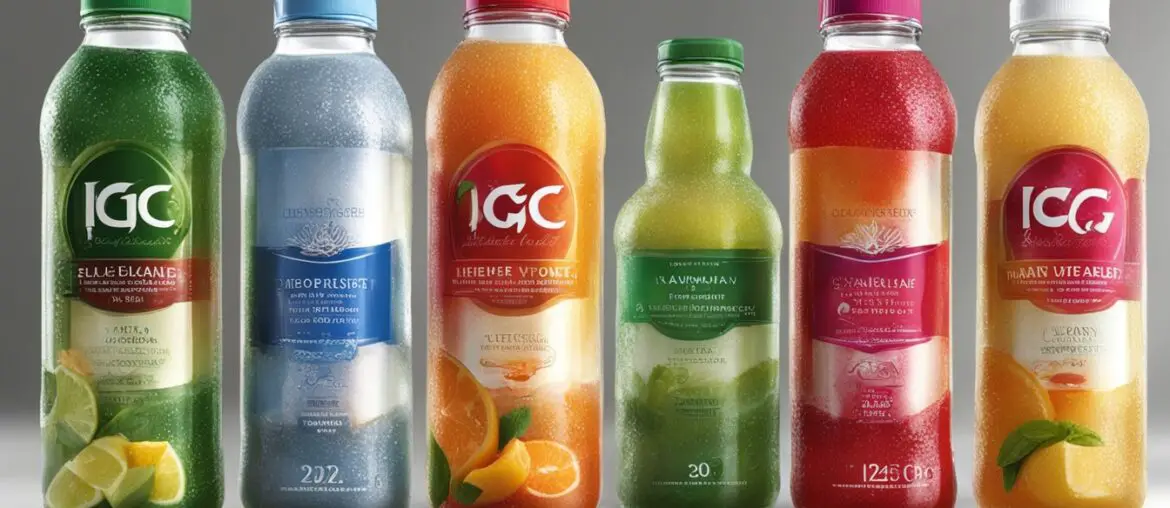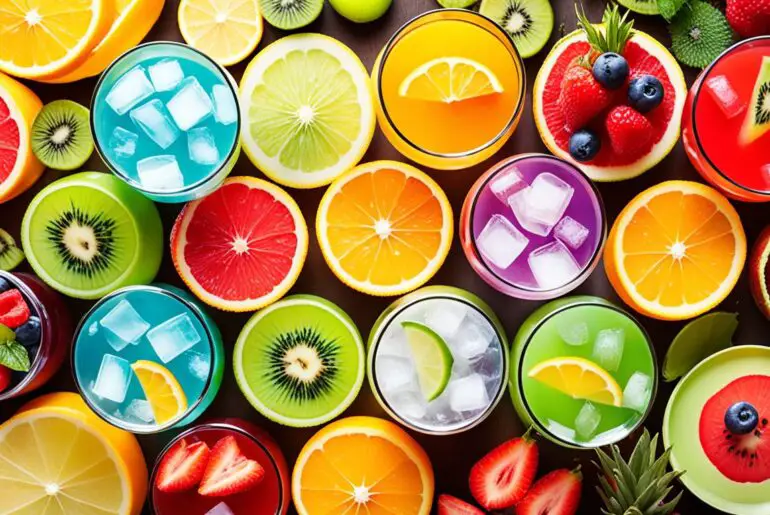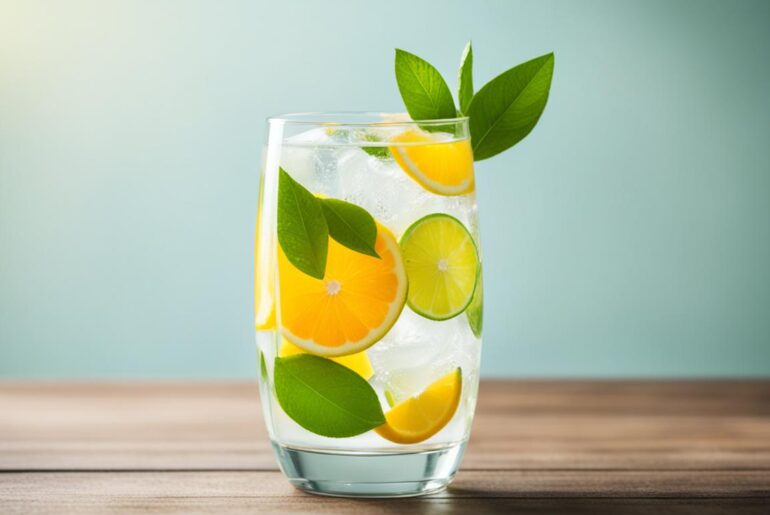Are you following the HCG diet and looking for refreshing drinks that won’t compromise your weight loss goals? It can be challenging to find zero calorie beverages that are compatible with this highly restrictive eating plan. But fear not, as I’m here to guide you through the world of HCG diet-friendly drinks.
Many people believe that all zero calorie drinks are suitable for the HCG diet, but that’s not entirely true. It’s crucial to choose beverages that do not contain sugar or artificial sweeteners, as they can hinder your progress or even lead to weight gain. So, the real question is: Which zero calorie drinks can you enjoy while on the HCG diet?
Key Takeaways:
- Choosing the right drinks is essential when following the HCG diet.
- Zero calorie drinks without sugar or artificial sweeteners are your best options.
- Stevia can be used to sweeten carbonated water or enhance the flavor of coffee and tea.
- Coffee and tea are allowed on the HCG diet, but be mindful of added ingredients.
- Avoid drinks with sugar, artificial sweeteners, and high-calorie content.
Understanding the HCG Diet
The HCG diet combines HCG supplements or hormone injections with a low-calorie diet. The diet is divided into three phases: the loading phase, the weight loss phase, and the maintenance phase. The goal of the diet is to achieve rapid weight loss, with some proponents claiming up to two pounds per day. However, it is important to note that there is no substantial evidence supporting the effectiveness or safety of the HCG diet. The diet is highly restrictive and not recommended by health experts.
Zero Calorie Drink Options for the HCG Diet
While following the HCG diet, finding zero calorie drink options can be challenging. Many “sugar-free” drinks are off-limits due to the presence of sugar substitutes that can negatively impact weight loss. However, there are still some refreshing and delicious options that can be enjoyed on the HCG diet.
Stevia-Sweetened Carbonated Water
Carbonated or sparkling water can provide a satisfying and HCG diet-friendly alternative to traditional soda. To add a touch of sweetness, consider using stevia as a natural zero calorie sweetener. Stevia is derived from the leaves of the stevia plant and can be found in plain flavors or different fruit-infused options. It adds a delightful taste to carbonated water without compromising your weight loss goals.
Coffee and Tea with Flavor Enhancers
Coffee and tea lovers, fear not! You can still enjoy your favorite hot beverages on the HCG diet. Opt for plain coffee or tea without any added sweeteners or flavors. To enhance the taste, consider adding a splash of lemon juice for a citrusy twist or one tablespoon of 2% milk for a creamier texture. Just be mindful of the quantity of milk to keep your calorie intake in check.
Remember, moderation is key when consuming coffee or tea on the HCG diet. While these beverages can be enjoyed, excessive caffeine intake should be avoided as it may interfere with the effectiveness of the HCG hormone.
Here’s a table summarizing the zero calorie drink options for the HCG diet:
| Drink | Description |
|---|---|
| Stevia-Sweetened Carbonated Water | Refreshingly fizzy HCG diet-friendly drink |
| Coffee | Plain coffee with optional lemon juice or 2% milk |
| Tea | Plain tea with optional lemon juice or 2% milk |
It’s important to note that while these zero calorie drinks can be enjoyed on the HCG diet, their consumption should align with the specific guidelines and limitations of the diet plan. Always consult with your healthcare provider or a registered dietitian before making any significant changes to your diet.
The Importance of Choosing the Right Drinks

When following the HCG diet, it is essential to make informed choices about the drinks you consume. Certain drinks can have a significant impact on your weight loss progress, so it’s crucial to be mindful of HCG diet restrictions and avoid ingredients that can hinder your results.
One common mistake people make is consuming sugar-free drinks without considering the presence of artificial sweeteners. While these beverages may seem like a healthy choice, they can actually cause stalls or even weight gain. Artificial sweeteners can disrupt your body’s metabolism and trigger cravings, ultimately sabotaging your weight loss goals.
To ensure you’re selecting the right drinks for the HCG diet, it’s vital to read the labels and check for hidden sugars or artificial sweeteners. Avoid drinks that contain ingredients like aspartame, sucralose, or saccharin, as these can have a negative impact on your progress.
Instead, opt for HCG diet-friendly drinks that do not contain sugar or artificial sweeteners. This will help you maintain the low-calorie intake required during the diet’s low-calorie phase. Natural alternatives like stevia can be a great option for sweetening drinks without compromising your weight loss efforts.
By choosing the right drinks on the HCG diet, you’ll be able to support your weight loss goals and avoid any setbacks in your progress. Stay mindful of the ingredients in the beverages you consume and make informed choices that align with the HCG diet guidelines.
Remember, achieving successful weight loss involves more than just following the HCG diet. It’s essential to maintain a balanced approach to nutrition, exercise regularly, and consult with a healthcare professional when embarking on any new diet plan.
| HCG Diet Restrictions | Sugar-Free Drinks | Artificial Sweeteners | Impact on Weight Loss |
|---|---|---|---|
| Avoid drinks with added sugars or sweeteners | Choose HCG diet-friendly beverages | Read labels and avoid artificial sweeteners | Support weight loss progress |
| Check for hidden sugars in drinks | Opt for natural alternatives like stevia | Avoid aspartame, sucralose, or saccharin | Avoid stalls or weight gain |
Stevia as a HCG Diet-Friendly Sweetener
When it comes to sweetening your HCG diet-friendly drinks, stevia is an excellent choice. Stevia is a natural zero calorie sweetener that can be used to add a touch of sweetness without compromising your weight loss goals. Unlike other sweeteners that can cause stalls or gains in weight, stevia allows you to indulge in the flavors you love without any guilt.
One of the great things about stevia is its versatility. It comes in a variety of flavors, including root beer, orange, and vanilla. These flavors can elevate the taste of your beverages, making them more enjoyable and satisfying. Whether you’re craving a refreshing root beer soda or a citrusy orange drink, stevia has you covered.
To make your HCG diet-friendly drinks more exciting, consider using stevia to sweeten carbonated or sparkling water. This provides a healthier alternative to traditional sodas, which are loaded with sugar and empty calories. By infusing your carbonated water with stevia, you can create refreshing and flavorful drinks that won’t derail your weight loss progress.
When selecting stevia for your HCG diet, it’s important to choose plain flavors without any added ingredients. Some flavored stevia products may contain additional components that could potentially impact your weight loss. By sticking to plain stevia flavors, you can ensure that you’re making choices that align with the HCG diet’s restrictions and guidelines.
With stevia as your go-to HCG diet-friendly sweetener, you can enjoy the flavors you love without compromising your weight loss goals. It’s a natural, zero calorie option that adds a touch of sweetness to your drinks. So go ahead, embrace the versatility and deliciousness of stevia as you navigate your HCG diet journey.
The Benefits of Using Stevia on the HCG Diet:
- Zero calorie sweetness
- Variety of flavors to choose from
- Enhances the taste of your drinks
- Safe alternative to traditional sodas
- No impact on weight loss when chosen wisely
By incorporating stevia into your HCG diet-friendly drinks, you can satisfy your sweet tooth while staying on track with your weight loss goals. Embrace the natural goodness of stevia and enjoy the delicious flavors it brings to your beverages.
Coffee and Tea Options on the HCG Diet
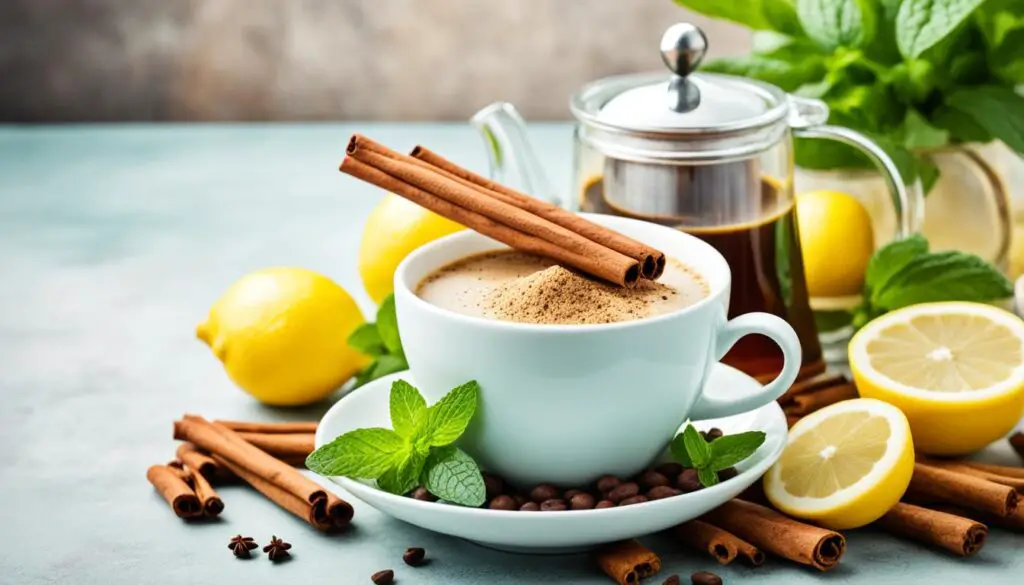
When following the HCG diet, you may be wondering if you can still enjoy your favorite coffee or tea. The good news is that coffee and tea are allowed on the HCG diet, but it’s important to make the right choices to ensure they align with the diet’s guidelines.
When it comes to coffee, it’s best to opt for plain options without any added flavors or ingredients that may hinder your weight loss progress. Flavored coffees often contain fruits, vegetables, or oils that can negatively affect your results. Stick to black coffee or add a tablespoon of 2% milk for a touch of creaminess.
Similarly, when it comes to tea, it’s important to choose plain options without any added ingredients. Avoid flavored teas that may contain fruits or oils that can impact your weight loss goals. Plain herbal teas like chamomile or green tea varieties are great choices. You can enhance the flavor by adding a squeeze of lemon juice or approved sweeteners like stevia.
Remember to always check the ingredients list of your coffee or tea to ensure they are HCG diet-friendly. By making the right choices and sticking to plain options, you can still enjoy your favorite hot beverages while following the HCG diet.
Avoiding Forbidden Drinks on the HCG Diet
While following the HCG diet, it is essential to be aware of the drinks that should be avoided. These prohibited drinks can hinder your progress and affect your weight loss goals. It is crucial to adhere to the HCG diet restrictions for optimal results.
One of the main restrictions on the HCG diet is avoiding sugary beverages. These drinks are high in calories and can lead to weight gain. It is important to steer clear of sodas, energy drinks, fruit juices, and other sweetened beverages. Instead, opt for sugar-free alternatives or zero calorie drinks to stay within the HCG diet guidelines.
Another category of drinks to avoid are high-calorie drinks. These beverages can quickly add up and hinder your weight loss progress. Alcoholic drinks such as beer and wine are particularly high in calories. It is best to abstain from them during the low-calorie phase of the HCG diet.
Additionally, drinks with artificial sweeteners should be avoided. While they may be sugar-free, artificial sweeteners can still impact your weight loss. They can cause stalls or even lead to weight gain. Make sure to check the ingredients of any drinks and avoid those that contain artificial sweeteners.
“Prohibited drinks on the HCG diet include sugary beverages, high-calorie drinks, and drinks with artificial sweeteners.”
HCG Diet Restrictions:
- Avoid sugary beverages such as sodas, energy drinks, and fruit juices.
- Avoid high-calorie drinks like beer and wine.
- Avoid drinks with artificial sweeteners.
By adhering to these HCG diet restrictions and avoiding prohibited drinks, you can ensure that your weight loss goals are not compromised. Paying attention to what you drink is just as important as what you eat during the HCG diet.
HCG Diet Tips and Considerations
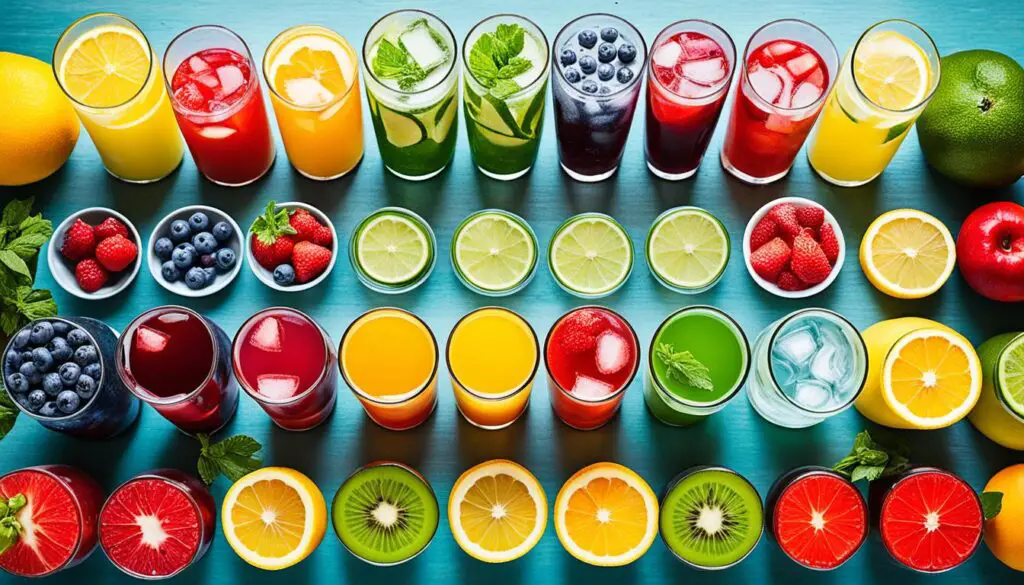
When following the HCG diet, it’s important to adhere to the diet’s guidelines and recommendations to ensure safe weight loss. The HCG diet is a highly restrictive eating plan that requires careful consideration to prevent nutrient deficiencies.
Here are some essential tips and considerations to keep in mind:
- Consult with a healthcare professional before starting the HCG diet to ensure it is suitable for your individual needs and health status.
- Follow the recommended HCG diet guidelines provided by your healthcare provider or a qualified nutritionist.
- Ensure you are obtaining all necessary nutrients while on the diet. It may be beneficial to incorporate high-quality supplements to address any potential nutrient deficiencies.
- Be mindful of your caloric intake. While the HCG diet is low in calories, it’s crucial to strike a balance between weight loss and meeting your body’s nutritional needs.
By taking these tips into account, you can safely navigate the HCG diet and minimize the risk of nutrient deficiencies.
| Considerations | Recommendations |
|---|---|
| The potential for nutrient deficiencies | Consult with a healthcare professional and consider incorporating high-quality supplements to address any potential deficiencies. |
| The importance of following HCG diet guidelines | Adhere to the recommended guidelines provided by your healthcare provider or a qualified nutritionist to ensure safe weight loss. |
| The balance between weight loss and nutritional needs | Be aware of your caloric intake and strive to strike a balance between weight loss goals and meeting your body’s nutritional requirements. |
| The significance of consulting with a healthcare professional | Prior to initiating the HCG diet, consult with a healthcare professional to assess its suitability for your individual health circumstances. |
Conclusion
In conclusion, the HCG diet is a highly controversial weight loss plan that combines illegal HCG supplements or hormone injections with an extremely low-calorie diet. While there are some zero calorie drink options that can be enjoyed on the HCG diet, it is important to approach this diet with caution and consult with a healthcare provider.
The HCG diet is highly restrictive and not recognized as safe or effective by health experts. It lacks substantial evidence supporting its effectiveness and safety. Therefore, it is crucial to consider alternative weight loss options that are safer and supported by evidence-based research.
Weight loss should always be approached in a healthy and sustainable manner, prioritizing a balanced diet, regular exercise, and professional guidance. Consulting with a healthcare provider or registered dietitian can provide valuable insight and guidance for achieving your weight loss goals while ensuring your overall well-being.
FAQ
What is the HCG diet?
The HCG diet is a weight loss plan that combines illegal HCG supplements or hormone injections with an extremely low-calorie diet. It is highly restrictive and not recommended by health experts.
Can I drink zero calorie beverages on the HCG diet?
Yes, there are some zero calorie drink options that can be enjoyed on the HCG diet, as long as they do not contain sugar or artificial sweeteners.
What are some HCG diet-friendly drinks?
Some HCG diet-friendly drinks include carbonated or sparkling water sweetened with stevia, and coffee or tea with lemon juice or 2% milk.
Why is it important to choose the right drinks on the HCG diet?
Choosing the right drinks is important to avoid stalls or weight gain on the HCG diet, as many “sugar-free” drinks contain artificial sweeteners that can impact weight loss.
What is stevia and why is it HCG diet-friendly?
Stevia is a natural zero calorie sweetener that can be used on the HCG diet. It can be used to sweeten drinks without causing weight gain or stalls.
Can I drink coffee and tea on the HCG diet?
Yes, coffee and tea can be consumed on the HCG diet. It is important to choose plain options and use approved sweeteners like stevia.
What drinks should be avoided on the HCG diet?
Sugary beverages, high-calorie drinks, and drinks with artificial sweeteners should be avoided on the HCG diet’s low-calorie phase. This includes soda, beer, and wine.
Are there any tips or considerations for the HCG diet?
It is always recommended to consult with a healthcare professional before starting any new diet plan, including the HCG diet. It is also important to follow the diet’s guidelines and recommendations for safe weight loss.
Can the HCG diet lead to nutrient deficiencies?
The HCG diet is highly restrictive and can potentially lead to nutrient deficiencies if not properly managed. It is important to ensure a variety of nutrients are obtained during the diet.
Is the HCG diet safe and effective for weight loss?
The HCG diet is a controversial weight loss plan and is not recognized as safe or effective by health experts. It is always recommended to consider alternative weight loss options that are supported by evidence-based research and recommended by healthcare professionals.

